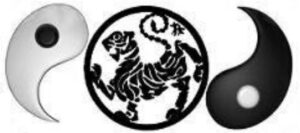When I first started Karate, back in the late 70’s (yes, I’m that old) we were taught by our Japanese masters to tense everything, the whole body, at the end of a technique. I’ve spoken many times about relaxing the body as much as possible and I’ve also talked about how our limbs should be taut at the end of a technique not tense.
Some muscle groups are very central to a given technique, whilst other muscles are not. If I take an example outside of martial arts for a moment, what muscles would you use for a push-up? It’s primarily pectorals (chest), deltoids (shoulders) and triceps (back of arms). So if you were doing a push-ups, would you consciously try to engage your quads, calves, glutes, neck and biceps? No, of course not. So why when we do martial arts, should we consciously try to tense (or engage) muscles that have very little function in any given technique? It wastes energy, slows us down as we’re focusing on irrelevant muscle groups and distracts us from the core object of delivering impact to the target.
Taking a punch for example; the arm should be taut at the point of completion, whilst muscle groups in the leg(s) and torso are engaged to push the body forward, hence sending the body-weight towards the target. Notice, I said muscles are “engaged”, not tensed. And why would you tense (make stiff) muscles required for movement? Whilst punching, the triceps are used to push the arm forward, but the biceps are not! In the hikite (pulling back) arm, the biceps are used more than the triceps. The neck muscles have very little role to play at all.
So where does the idea of tensing (or as I prefer - engaging) the whole body, come from as not all muscle groups are used equally for any given technique.
Please check out the video below for more detail:-
Many instructors of all styles have moved on from this “tense everything” at the end approach, but probably many more are still doing it. What about your club/association, which way do they teach?

Charlie, I am in denial and I don’t mean Egypt - I am the same age as you and I cannot be old because I am still working toward shodan. Once again, thanks for another informative article, with valuable and useful advice. As one necessarily gets weaker and slower with age the importance of relaxation wherever possible becomes all the more important.
Hi Barry
Lol! I think that is the most visited river in the world 🙂
Keep going mate. I had a lady start with me in her late 60’s. She got her Shodan at 72!
I’m glad you found it useful, it’s always nice to get this kind of feedback and know that people find it valuable.
And I totally agree with your comments on aging.
Good luck getting your Shodan.